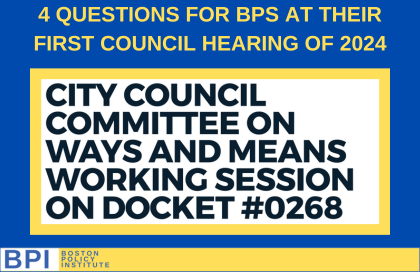Ed Expert: 4 Questions for BPS as education officials go before the Council Ways & Means Committee on Thursday
BPI asked our education expert for the questions to listen for as district leaders discuss the FY25 budget before Boston City Council’s Ways and Means Cmte
On Thursday, March 14, 2024 the Boston City Council’s Ways & Means Committee is hosting a working session where officials from the Boston Public Schools (BPS) will answer Councilors’ questions about the school system’s FY25 Budget. The working session is the result of City Councilor and Ways & Means Chair Brian Worrell work:
Proposed the working session at the Council’s January 31, 2024 meeting, where he said that BPS is “confronting a fiscal cliff” with the end of COVID-era federal funds, and wanted to give his colleagues “an opportunity to collaborate with the administration to help influence and bring our constituent voices to the table,” - READ MORE
Chaired the Request for Information meeting on February 12, 2024 where Councilors submitted questions to BPS, including on the end of federal school aid, the switch away from Weighted Student Formula, and on BPS long-term facilities plan - READ MORE
Testified before the Boston School Committee, laying out both his colleagues priorities and his own vision for an expanded role for the Council in the BPS budget process going forward - READ MORE
Boston Policy Institute, Inc (BPI) has followed Councilor Worrell’s early entrance into Boston Public School’s budget deliberations with a particular eye on another issue: the Systemic Improvement Plan (SIP) signed between the Boston Public Schools (BPS) and the Massachusetts Department of Elementary and Secondary Education (DESE) in June 2022. The agreement, which allowed Boston to avoid a state takeover of its public school system, aimed to fix significant and persistent challenges within BPS as identified by a DESE district review.
BPI commissioned education expert Erin Cooley to analyze where the June 2022 agreement stood 18 months after being signed and released that analysis in February. In her analysis, Cooley found that while BPS reported meeting most of the SIP requirements, DESE was not necessarily satisfied with the district's progress. BPS and Wu administration officials were scheduled to update DESE’s board in December 2023 about the district's efforts to meet the SIP goals, but that meeting was unexpectedly canceled. An update was not provided at DESE's January or February board meeting, and according to Contrarian Boston the public update has not been rescheduled.
Thursday’s Ways and Means working session provides an opportunity for Boston City Councilors to ask about how the SIP is proceeding, and how its requirements have impacted the FY25 budget. Below, Erin Cooley provides four questions (with context, examples, and specific follow-ups) to look for at Thursday’s hearing as it relates to the FY25 budget and the SIP.
1) How does the FY25 budget address the remaining SIP requirements?
This is the final BPS budget that will be passed before the SIP agreement ends in June 2025. Is there enough money in the budget to ensure all of the required SIP items are met by the deadline? For example, how much of FY25 funding is earmarked for the Strategic Plan for Multilingual Learners required by the SIP?
2) The SIP required investment in additional data quality practices and indicated FY24 dollars should be spent (if necessary) for implementation of those practices. - is there any monetary investments being made to these practices in FY25?
The BPS data quality issue was highlighted in press coverage a little over a year ago (Boston Globe, February 2023):
Boston Public Schools has poor data collection and reporting processes, resulting in inaccurate, incomplete, and otherwise unreliable data in many areas, including bus performance and graduation rates, according to a review released Friday as part of the district’s state-mandated improvement plan.
3) The district agreed to design a performance management system for all schools in collaboration with DESE - how is that proceeding?
There was no timeline outlined on the SIP for the performance management system- where are we with design and implementation? Once approved, will there be budget implications either for roll out and/or school outcomes? For example, if a school ranks low on performance management indicators, will they require additional supports/resources? Should that be baked into the FY25 operating budget?
4) A long-term facilities plan was published in January but BPS leaders have said the plan is intended to serve as a procedural framework for decision-making about facilities - how are facilities decisions being made in the meantime?
The BPS budget presentations highlight an increase of $11M in funding for facilities maintenance and repairs, plus a cost savings of $10M through reconfigurations. Boston has also submitted a number of schools to the Massachusetts School Building Authority’s (MSBA) CORE and ARP programs. The MSBA does fund school repairs and new construction, but places significant restrictions on how those buildings can be used in the future. How do the projects submitted to the MSBA and the FY25 school reconfigurations play into the long-term facilities plan? When are more details (i.e. a master plan) expected for all schools?
Boston Policy Institute, Inc is working to improve the public conversation - help us by following BPI on Facebook, Instagram, Threads, Twitter, and LinkedIn.




